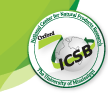Document Type
Oral Presentation
Location
Oxford Convention Center, 102 Ed Perry Boulevard Oxford, MS 38655
Event Website
https://www.oxfordicsb.org/
Start Date
27-4-2023 10:30 AM
Description
Mulberry leaf extract high in the iminosugar 1-deoxynojirimycin (DNJ) has been shown in previous studies to inhibit glycosidase enzyme activity. A novel supplement including mulberry leaf extract, berberine and cinnamon extract was evaluated in a two-cohort study using endpoints of glycemic variability, postprandial glucose response, fasting glucose, fasting insulin, and safety markers. In the first cohort (n=15), these endpoints were determined over two weeks by continuous glucose monitoring (CGM) and blood/urine analyses in healthy adults. Approximately half of the participants (n=7) took a dosage of 250 mg prior to each meal, and the other participants (n=8) took 500 mg before each meal. This cohort also included a standardized high-carbohydrate meal for breakfast. Following an interim analysis, the supplement was evaluated for the same endpoints during an additional two months in a second cohort of healthy volunteers (n=30).
The first cohort demonstrated a significant difference in the glucose coefficient of variation between supplement and placebo (p=0.0440). Participants taking the 500 mg dosage showed larger decrease in postprandial glucose levels than participants taking the 250 mg dose (p=0.033), so the 500 mg dose was continued into the second cohort.
Participants in the second cohort were randomly assigned to take 500 mg dose of supplement or placebo before each meal for 1 month, then cross over to the other treatment for 1 month. Postprandial glucose levels were significantly decreased in participants taking the supplement compared to placebo (p=0.001). Overall glucose variability was significantly different between supplement and placebo (p=0.0238). Fasting glucose and fasting insulin were not significantly different. Safety markers such as liver enzymes were not significantly affected, and no serious adverse events occured.
This novel supplement demonstrated significant potential for postprandial glucose modulation. Additional studies will evaluate the supplement to determine long-term efficacy in various cultural, ethnic, and real-world contexts.
Recommended Citation
Stevens, Nicole, "Effects of a novel botanical supplement on glycemic variability and postprandial glucose response" (2023). Oxford ICSB. 14.
https://egrove.olemiss.edu/icsb/2023_ICSB/schedule/14
Publication Date
April 2023
Accessibility Status
Searchable text
Included in
Effects of a novel botanical supplement on glycemic variability and postprandial glucose response
Oxford Convention Center, 102 Ed Perry Boulevard Oxford, MS 38655
Mulberry leaf extract high in the iminosugar 1-deoxynojirimycin (DNJ) has been shown in previous studies to inhibit glycosidase enzyme activity. A novel supplement including mulberry leaf extract, berberine and cinnamon extract was evaluated in a two-cohort study using endpoints of glycemic variability, postprandial glucose response, fasting glucose, fasting insulin, and safety markers. In the first cohort (n=15), these endpoints were determined over two weeks by continuous glucose monitoring (CGM) and blood/urine analyses in healthy adults. Approximately half of the participants (n=7) took a dosage of 250 mg prior to each meal, and the other participants (n=8) took 500 mg before each meal. This cohort also included a standardized high-carbohydrate meal for breakfast. Following an interim analysis, the supplement was evaluated for the same endpoints during an additional two months in a second cohort of healthy volunteers (n=30).
The first cohort demonstrated a significant difference in the glucose coefficient of variation between supplement and placebo (p=0.0440). Participants taking the 500 mg dosage showed larger decrease in postprandial glucose levels than participants taking the 250 mg dose (p=0.033), so the 500 mg dose was continued into the second cohort.
Participants in the second cohort were randomly assigned to take 500 mg dose of supplement or placebo before each meal for 1 month, then cross over to the other treatment for 1 month. Postprandial glucose levels were significantly decreased in participants taking the supplement compared to placebo (p=0.001). Overall glucose variability was significantly different between supplement and placebo (p=0.0238). Fasting glucose and fasting insulin were not significantly different. Safety markers such as liver enzymes were not significantly affected, and no serious adverse events occured.
This novel supplement demonstrated significant potential for postprandial glucose modulation. Additional studies will evaluate the supplement to determine long-term efficacy in various cultural, ethnic, and real-world contexts.
https://egrove.olemiss.edu/icsb/2023_ICSB/schedule/14


Comments
We gratefully acknowledge the efforts of Alex DaBell and his team for formulation of this supplement; Cecile Bascoul and her team for compiling background safety information; Andrea Melton for clinical research support; and Karissa Jolley for data gathering and organization.